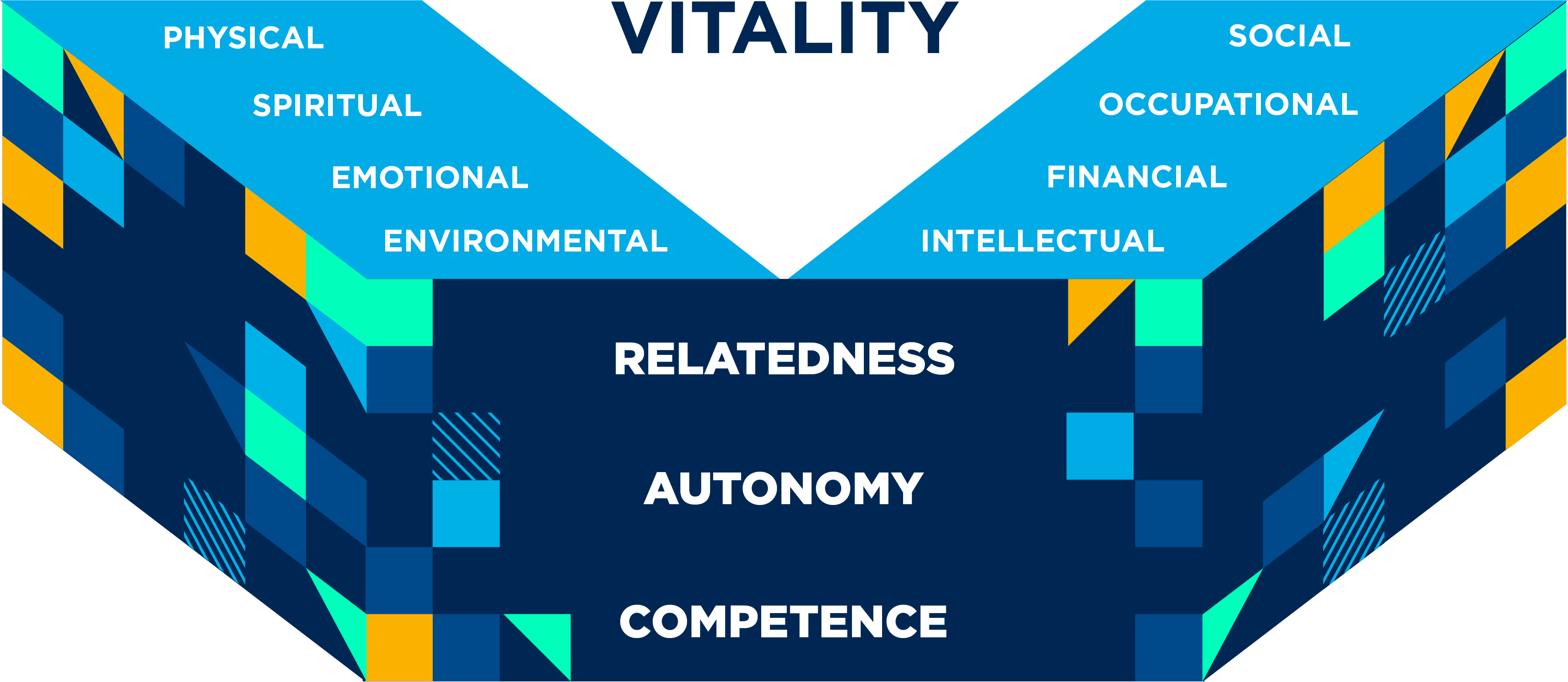
According to the World Health Organization (WHO), burnout is a syndrome that results from chronic work-related stress. It’s characterized by three dimensions:
- feelings of energy depletion or exhaustion
- increased mental distance from one’s job or feelings of negativism or cynicism related to one’s job, and
- reduced professional efficacy
On the flip side of burnout is vitality—a person's capacity to pursue life with health, strength, and energy. By helping employees improve their vitality—at work, at home, and in their communities—companies can create a culture of health that addresses the challenges that burned-out or disengaged employees face and stimulates better business outcomes.
Vitality Fuels a Healthy and Engaged Workforce
Cigna has long understood the intrinsic connection between physical and mental health, and this connection is foundational to our approach to whole-person health. But the COVID-19 pandemic has had a profound impact on the way people live and work. According to the American Psychological Association (APA), burnout is at an all-time high across professions. Because stress and burnout often lead to serious health conditions, Cigna felt driven to take steps to address the challenges people are experiencing in the workplace and in their communities.
To do so, we partnered with the world's foremost authority on vitality, Dr. Richard Ryan, to develop the Evernorth Vitality Index. This comprehensive measure of vitality incorporates eight interdependent dimensions of health and well-being while accounting for how individuals feel about their ability to make their own choices and be in control of their life across those dimensions.

By better understanding vitality and the factors that impact it, employers have a path to more deeply recognize the unique needs of their people, make meaningful investments in workforce health, and grow.
Our research shows that vitality is a driver of health status and life engagement for individuals and a catalyst for business and community growth. Using the Evernorth Vitality Index, we surveyed more than 10,000 U.S. adults—the most comprehensive study to date on vitality. Our data revealed vitality is strongly linked to healthier and more engaged workers.
Specifically, workers with higher vitality are more likely to:
- Demonstrate strong job performance
- Be satisfied with their job and stay with their employer
- Report their employer provides adequate opportunities to care for personal health
- Experience excellent physical and mental health
- Feel connected to their coworkers and have strong relationships with their managers
In general, people with high vitality are more present, more productive, and perform better. Those with low vitality have higher rates of absenteeism, poor work performance, higher turnover, and workplace dissatisfaction.
Addressing the Lesser-Known Dimensions of Health
Companies often focus on two commonly known dimensions of health: physical and emotional. While these efforts are crucial, total well-being encompasses more than body and mind. There are six lesser-known dimensions of health that need to be addressed when building a culture of health and elevating employee vitality.
Environmental Well-Being
This refers to one's sense of safety, comfort, and connection with their physical surroundings. In our study, 43% of workers with high vitality said they could easily express their opinions or feelings about job conditions, compared to 26% of all workers.
Takeaway: Employers can enhance workers' environmental well-being with policies and programs that promote a supportive and safe workplace. Inspiring spaces can also help employees feel more comfortable and motivated to connect within their work environment.
Cigna's solutions in this area include:
- Organizational and environmental assessments
- Productivity @ Work seminars around environmental well-being and ergonomics
- Digital resources to create and support well-being programs
- Strategy for enhancing supportive workplace culture and policies
Financial Well-Being
This means that people feel secure about their ability to live within their means. A 2022 study by the American Psychological Association found that money is a significant source of stress for 65% of Americans. Workers with high vitality in our survey were significantly more likely to have received a raise (38% vs. 27%) or promotion (19% vs. 9%) in the last year than those with low vitality.
Takeaway: Employers can drive wellness in this area through health insurance benefits that help employees afford their health care and by providing opportunities to increase compensation. Access to easy-to-use apps and other financing and counseling services can help employees stay on top of their personal finances.
Cigna's offerings in this area include:
- Legal, financial, and identity theft phone consultations [i]
- Cigna Life Connected financial education series
- Financial benefits awareness campaigns
- Productivity @ Work seminars around being fiscally fit and consumerism
- Supplemental Health Solutions such as Accidental Injury, Critical Illness, and Hospital Care benefits that can help provide additional financial protection [ii]
Social Well-Being
This involves connecting with people in a healthy, nurturing manner at work, at home, and in the community. Studies have shown that people with social support and who feel connected enjoy better health than those who are socially isolated. In our study, employees with high vitality overwhelmingly felt connected with people at work (79%) compared to only 12% of those with low vitality.
Takeaway: Companies can foster connections between coworkers, managers, and senior leaders through collaborative (and yes, sometimes non-work-related) team meetings, town hall events, volunteer activities, and health promotion campaigns.
Cigna's offerings in this area include:
- Employer education on health equity, diversity, and inclusion
- Community engagement resources
- Productivity @ Work seminars around fostering social positivity and connectedness
- Health promotion campaigns and challenges
- Cigna Life Connected social well-being education series
Intellectual Well-Being
This occurs when people can engage in mentally stimulating ways to expand their knowledge. It can be developed through personal and professional development, cultural involvement, community involvement, and hobbies. High-vitality workers are 48% more likely to feel they receive appropriate recognition and rewards at work than their low-vitality counterparts.
Takeaway: Employers can set the stage for intellectual well-being by offering opportunities to learn new skills and providing recognition programs.
Cigna offers its employees access to a free learning platform that includes courses beyond what is legally required to perform one’s job. These courses can help employees improve their job skills or learn about broader industry topics.
Spiritual Well-Being
Cigna defines spiritual well-being as the ability to manage everyday stresses, be productive, and contribute at home, at work, and in the community.
One of the ways Cigna provides space for our employees to manage everyday stresses is through free online guided meditation, exercise, or breathing exercises.
Takeaway: Making workers feel valued, nurturing a sense of autonomy, encouraging mindfulness, and providing growth opportunities are all ways companies can help employees find more meaning and purpose in the workplace.
Occupational Well-Being
This encompasses what people experience at work, including work-life balance, work-related stress, supervisor relationships, and health care opportunities. Our vitality study found strong ties between work culture and employee vitality levels but noted variations in vitality levels across industries. For example, finance and technology workers have some of the highest vitality levels, while hospitality, retail, and transportation workers have some of the lowest.
Takeaway: Enabling occupational well-being starts with training managers to be empathetic, programming and learnings for employees on work-life balance, and by encouraging leadership to demonstrate how they manage work and life.
Like many organizations, Cigna has a wide variety of Employee Resource Groups that support community connection as well as educational and network resources.
Cigna's offerings in this area include:
- Employee Assistance Program (EAP) [iii], which is designed to meet the personal assistance needs of participants, the supervisory assistance needs of managers, and the organizational and crisis needs of the client—all aimed at improving workplace productivity and employee wellness.
Fostering Vitality Is Good for Business
Cigna's research shows that a workforce made up of high-vitality employees is more engaged and productive and drives better business outcomes. With a deeper understanding of how employee disengagement affects many aspects of the business, companies can raise the bar when addressing the lesser-known health dimensions to promote a culture of health that fosters vitality.
At Cigna, we strive to set an example for how workers can be accountable for their vitality during the workday. Our approach involves three key components:
- Employees are accountable to themselves and empowered to achieve vitality on their own time and in their own way.
- Management allows time and energy for employees to fulfill their needs, offering direct and indirect support.
- Companies allocate resources to enable the achievement of #1 and #2.
Forging a Path Ahead, Together
Individuals, employers, and health care providers have the power to influence vitality and make a direct impact on health and productivity by building a culture of health that prevents burnout and quiet quitting. But until now, little has been done to help people understand how to access and improve vitality within themselves.
By increasing the understanding of vitality through the lens of whole-person health, we can open doors to small and large improvements to well-being.

Read the Report: The State of Vitality in the United States
We used the Evernorth Vitality Index to survey more than 10,000 adults across the U.S. – the largest study ever done on vitality and health.
[i] Our legal services provide access to a nationwide network of participating law firms and attorneys, all in good standing with their local bar associations. Get an initial, no-cost consultation and a discount on legal fees for help with family law, real estate concerns, estate planning and more. Identity theft consultation services are also available. Legal consultations related to employment-related matters are not available under this program.
[ii] These policies pay limited benefits only. They are not comprehensive health insurance coverage and do not cover all medical expenses. This coverage does not satisfy the “minimum essential coverage” or individual mandate requirements of the Affordable Care Act. This coverage is not Medicaid or Medicare Supplement Insurance. Accidental Injury, Critical Illness, and Hospital Care plans or insurance policies are distributed exclusively by or through operating subsidiaries of Cigna Corporation, are administered by Cigna Health and Life Insurance Company, and are insured by either (i) Cigna Health and Life Insurance Company (Bloomfield, CT); (ii) Life Insurance Company of North America (“LINA”) (Philadelphia, PA); or (iii) New York Life Group Insurance Company of NY (“NYLGICNY”) (New York, NY), formerly known as Cigna Life Insurance Company of New York. The Cigna name, logo, and other Cigna marks are owned by Cigna Intellectual Property, Inc. LINA and NYLGICNY are not affiliates of Cigna.
[iii] Employee assistance program services are in addition to, not instead of, health plan benefits. These services are separate from health plan benefits and do not provide reimbursement for financial losses. Customers are required to pay the entire discounted charge for any discounted legal and/or financial services. Legal consultations related to employment matters are excluded. Additional restrictions may apply. Program availability may vary by plan type and location, and are not available where prohibited by law.